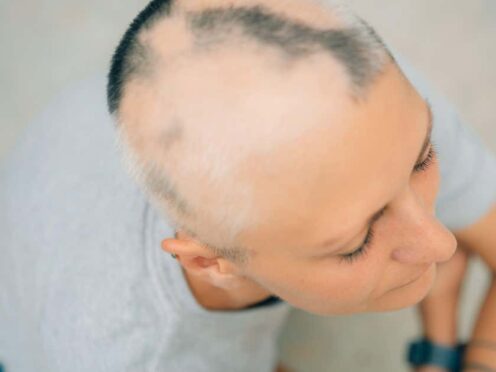
Thousands of patients are to benefit after health officials approved an alopecia treatment for widespread NHS use for the first time.
Alopecia UK said that patients have gone without NHS treatment for “far too long” and hailed the decision as a “monumental day” for people with alopecia areata.
People with severe alopecia areata can now be prescribed a daily tablet to improve hair regrowth, following the decision from the National Institute for Health and Care Excellence (Nice).
Nice said that up to 14,000 people could benefit from ritlecitinib (also known as Litfulo).
The health body has recommended that people over 12 with severe alopecia areata should be given access to the drug, which is made by Pfizer.
It is the first alopecia treatment Nice has recommended for use on the NHS.

Nice’s appraisal committee initially rejected the drug last year but the health body said it was able to reverse its decision following a public consultation as well as getting more information about the drug and a discount to its price.
As a result it was able to recommend the drug as a “clinically and cost effective” treatment for use in the NHS.
Alopecia areata is an autoimmune disease, where the body’s immune system attacks the hair follicles causing the hair to fall out.
The new treatment, taken as a daily pill at home, works by reducing the enzymes that cause inflammation and subsequent hair loss at the follicle.
Commenting on the news, Sue Schilling, chief executive of Alopecia UK, said: “This is a monumental day for the alopecia areata community.
“For far too long, patients with alopecia areata have gone without a licensed treatment option available via NHS pathways.
“If new treatments are only available privately, it becomes a case of the ‘haves and the have nots’, this latest Nice recommendation will go some way to address this.
“Our community still faces substantial barriers including difficulties in getting a dermatology referral from their GP, unacceptable dermatology waiting times, and even some NHS trusts making the decision not to allow dermatology appointments for alopecia patients.
“There is no longer the excuse of there being no licensed treatment available. I urge key decision makers within the NHS to keep referral pathways open for patients with alopecia areata.”
Helen Knight, director of medicines evaluation at Nice, added: “Our committee heard how severe alopecia areata can have a significant impact on people’s health and quality of life.
“I’m delighted that we are now able to recommend this innovative treatment, the first time a medicine for severe alopecia areata has been recommended by Nice for use in the NHS.
“It is especially pleasing that we have been able to recommend ritlecitinib just 16 weeks after it was granted a licence by the Medicines and Healthcare products Regulatory Authority, demonstrating Nice’s commitment to getting the best care to patients fast.”
Lynn Clay, specialty care lead at Pfizer UK, said: “Alopecia areata can have a psychological impact on adults and adolescents living with the condition.
“Today’s decision is an important milestone for eligible patients with severe hair loss from alopecia areata to help them access treatment.”
An NHS England spokesperson said: “People suffering with severe alopecia areata can experience hair loss that affects their health and quality of life, and this latest innovative treatment for patients – the first NHS treatment for the condition – could greatly benefit thousands of people.”

Enjoy the convenience of having The Sunday Post delivered as a digital ePaper straight to your smartphone, tablet or computer.
Subscribe for only £5.49 a month and enjoy all the benefits of the printed paper as a digital replica.
Subscribe